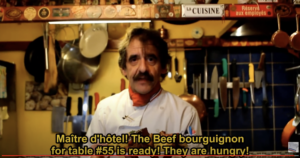
Screenshot from Dumas’ show, YouTube
Cooking shows are a busman’s holiday for me, given I have always done the cooking in the family. Over the decades one of my recreations has been watching Jacques, Julia, the Two Fat Ladies, Keith Floyd, and others, including Bourdain, who was rarely shown cooking but did his traveling first as a chef interested in foodways. I also like watching many non-show videos, such as street vendors making their wares at great speed, in quantity, for perhaps the hundred-thousandth time. Masters at work remind me of the vanishing back of perfection and of fundamental, shared activities of life.
In recent years social media has offered up other cooking videos that are often unwatchable. Some are merely clickbait, existing only to get ads in front of us, and who knows what or why this is. There is a lot of gross-out-for-clicks. There are restaurant owners making giant, odd sandwiches no one could eat and would-be cooks fussing inefficiently and demonstrating poor knife skills.
I was doubtful the first time I saw Chef Michel Dumas, only last month, because of the knives. Dumas is a Quebecois chef who has been on YouTube for eight years; his channel has a million subscribers (Facebook more than two million) and hundreds of videos that show how to make everything from classic boeuf Bourguignon to le Big Mac. He is a tall, thin, droopy-faced man in chef’s whites and a cravat, his eyebrows bushy and his mustache like the ones Hemingway says French waiters awarded medals for gallantry in the war used to wear.
His videos are almost entirely in French, though there are a few dubbed (by him, I think) in English, and a few more subtitled in English. (YouTube chokes badly when it tries to do the translation itself.) There is the feeling that one must take him as he is, even if that cuts down on possible income.
He cooks in a tiny corner of a kitchen that is well-organized and sparingly outfitted with professional KitchenAid and other appliances, but he tends to use paring knives to cut most things, and he insists on cutting food with a knife that matches its color. Red bell pepper is cut with a red-handled paring knife—then put in a red plastic bowl—and when the knife has been used it is thrown forcefully into a sink out of frame, against most notions of safety and gear maintenance.
“Now he [the knife] will rest,” Chef says.
Dumas’ knife skills are impeccable, however, and every recipe looks time-suckingly authentic, honest in its ingredients, and delicious. “Impeccable” (with the French pronunciation) is a word he says approximately once a minute to describe his own work.
I was thinking about how odd all the enduring diva chefs have been, more as a consequence of being themselves—intelligent and offbeat—than of having invented personalities for the camera. (“Bam!”: give me a break.) Julia Child was naturally raw-boned and warble-voiced, not to mention bossy when cooking with others; the amusing banter of Clarissa Dickson Wright and Jennifer Paterson of Two Fat Ladies resulted from educations in more than one mode and lives (especially childhoods) that were often painful or colorful.
I cannot find much in English about Chef Michel Dumas, but he looks as if he has lived in that body and earned his technique. On Facebook he announces “Vidéos de cuisine facile avec une touche d’humour!” Many of them are not so easy, but they do have humor, especially in his repetition of phrases such as “impeccable,” “tourne et retourne,” and “super nickel,” and sign-offs where he shouts, “Maître d’hôtel, pick up the order for Table 55!” He thanks viewers, students at cooking schools, and schoolchildren around the globe.
“Salut, ‘bye!” he shouts.
The knives are sold in packs of five at his website, which is so lacking in commercial savvy that I like him even more.
